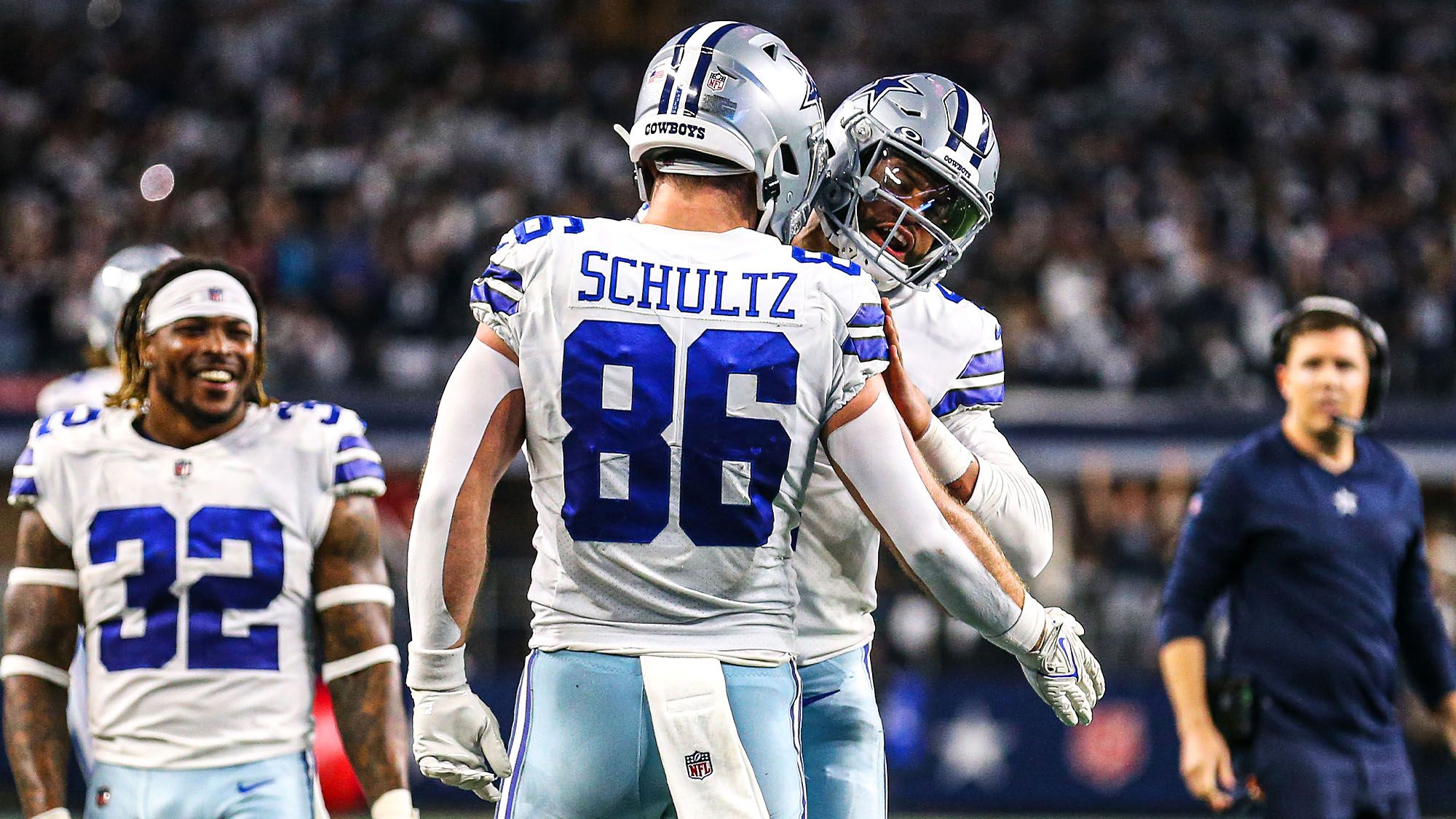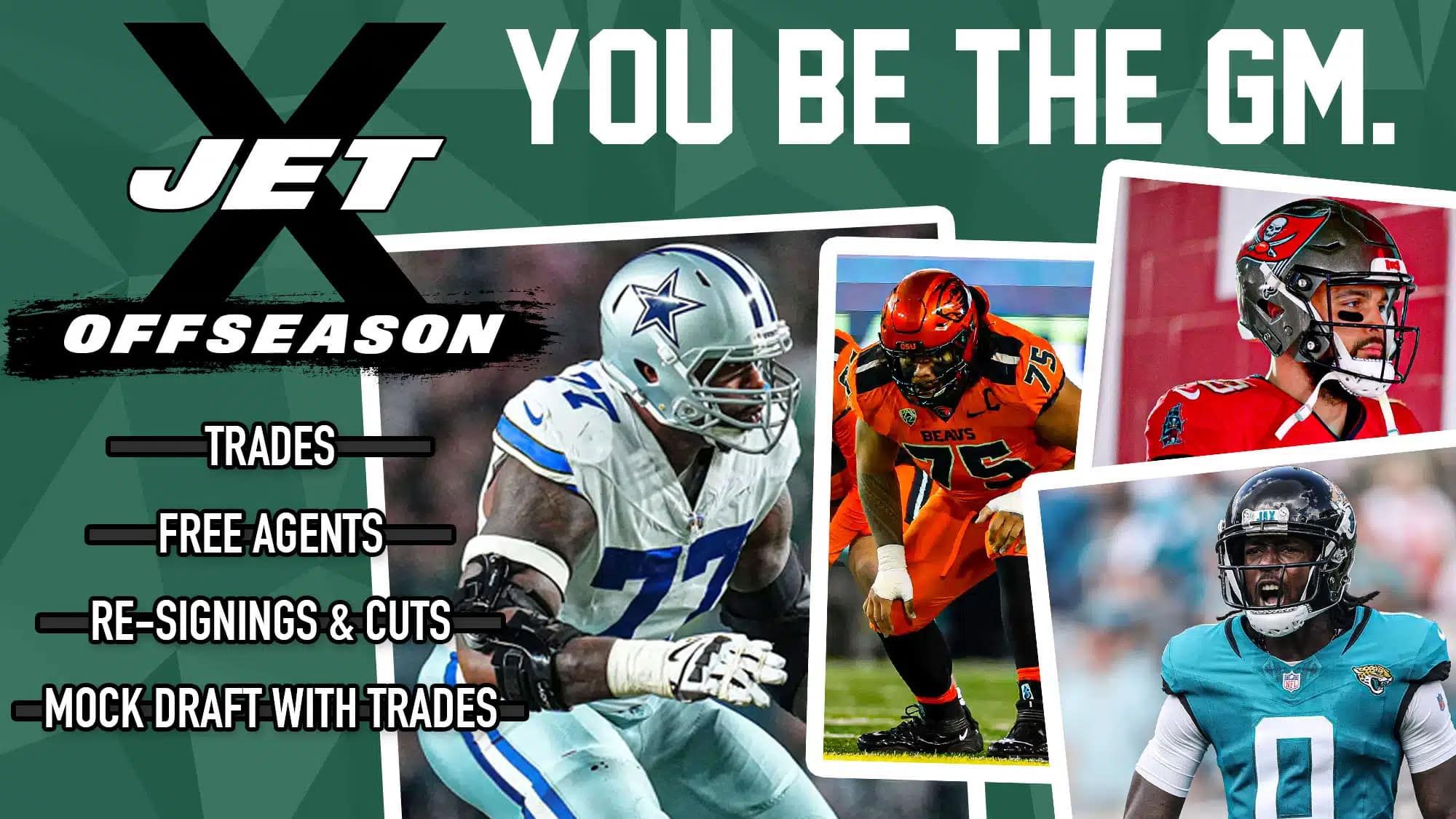Who should the New York Jets turn to at tight end if they fail to sign Dalton Schultz?
The New York Jets have an enormous need at the tight end position entering the 2022 offseason. Their only tight ends under contract are Ryan Griffin, Trevon Wesco, and Kenny Yeboah, who combined for twice as many drops (4) as touchdown catches (2) in 2021.
While New York’s need at the tight end position is already dire enough simply due to the lack of talent, the hole becomes especially glaring when you consider the vision of offensive coordinator Mike LaFleur.
The rookie play-caller planned to build the Jets’ offense around a heavy reliance on 12 personnel packages (which feature two tight ends on the field). LaFleur began the season using a ton of 12 personnel packages but gradually phased them out of the offense as the season progressed due to the Jets’ deficiencies at tight end.
For LaFleur’s offensive vision to be fulfilled, the Jets must have a strong tight end unit. They need a high-quality TE1 who is a good in-line blocker in addition to being a top receiving threat. Plus, they need a complementary TE2 who is at least sufficient as both a blocker and receiver.
In December, I identified Dallas Cowboys tight end Dalton Schultz as the perfect free-agent target to fulfill the Jets’ need for a TE1. Schultz provides everything that the Jets need from the position. New York should go all-out in pursuit of his services if he hits the open market.
Related Article: Why Dalton Schultz is a perfect free agent target for the Jets
Here’s the problem: The free-agent tight end market is extremely thin. Schultz is the only top-tier tight end on the free-agent market who fits what the Jets need in their TE1.
Miami’s Mike Gesicki joins Schultz as the only other big-ticket tight end on the market, but Gesicki is not of the type of tight end that the Jets need.
Schultz is the guy. If the Jets fail to get Schultz, they’re out of luck when it comes to finding a legitimate TE1 who fits their scheme.
However, even if the Jets miss out on Schultz, they still need to use free agency as best they can to add talent to their tight end room. General manager Joe Douglas has to do something here.
Most of the free-agent tight ends after Schultz and Gesicki are uninspiring, but there are two in particular who stand out as excellent fallback options for the Jets. These two players have a defined set of strengths that could be put to good use in the Jets’ scheme.
Maxx Williams, Arizona Cardinals
A second-round pick of the Ravens in 2015, Maxx Williams has never fulfilled his potential as a pass-catcher, but he has established himself as one of the best blocking tight ends in football.
Check out Williams’ run-blocking grades at Pro Football Focus over the past five seasons:
- 2021 (ARI): 72.0 (12th / 88 TEs)
- 2020 (ARI): 70.5 (14th / 88)
- 2019 (ARI): 84.7 (1st / 86)
- 2018 (BAL): 69.7 (16th / 90)
- 2017 (BAL): 64.7 (27th / 89)
Williams is also a solid pass-blocker. Over the same five-season span, he has allowed 10 pressures over 217 snaps in pass protection, a rate of 4.6% that falls below the 2021 positional average of 5.3%. Comparatively, the Jets’ Tyler Kroft and Ryan Griffin combined to allow 11 pressures in 2021 alone (on 116 pass-blocking snaps for a 9.5% rate).
You’re not signing Williams for his abilities as a receiver, but in 2021, he was on track for his best pass-catching season before a season-ending ACL injury in Week 5.
In five games, Williams caught 16 of 17 targets for 193 yards and nine conversions (1 TD, 8 first downs). His average of 38.6 receiving yards per game was more than double his previous career-high (19.1 as a rookie).
Comparatively, Kroft had nine conversions in nine games last year while Griffin had 14 conversions in 14 games. Kroft averaged 19.2 yards per game and Griffin averaged 18.6.
Even if Williams’ short-lived receiving outburst in 2021 turns out to be a flash in the pan, he has still proven that he at least gives you reliable hands. Williams has only two career drops against 102 receptions, giving him a drop rate of 1.9%. In 2021, Kroft had four drops and Griffin had three.
To boot, Williams has sneaky-good elusiveness. Since joining the Cardinals in 2019, Williams has forced 11 missed tackles after the catch on only 28 receptions. That’s an average of 0.282 missed tackles forced per reception, nearly triple the 2021 league average for tight ends (0.108).
Williams would be a very nice complementary tight end in New York (provided he is healthy and still in peak form after his ACL injury).
David Njoku, Cleveland Browns
Like Williams, David Njoku has never lived up to his draft slot. The 27th overall pick in the first round of the 2017 draft, Njoku averaged only 27.0 receiving yards per game over his five-year career in Cleveland.
While Njoku is not the dynamic playmaker the Browns hoped he would be, he can certainly be a respectable TE2 or low-end TE1 in this league.
Njoku quietly had a very efficient year as a receiver in 2021.
The Miami product ranked 13th out of 76 qualified tight ends in yards per route run (1.56), seventh in yards per reception (9.0), and 21st in Pro Football Focus’ receiving grade (70.0).
In the box score, Njoku caught 36 of 53 targets for 475 yards and 17 conversions (4 TD, 13 first downs) over 16 games. He ranked 22nd at the position in receptions and 24th in receiving yards.
A big key to Njoku’s resurgence in 2021 was his improved catching.
Njoku had enormous drop issues over his first four seasons. From 2017-20, Njoku had 16 drops and 112 receptions for a putrid drop rate of 12.5%. For comparison, the 2021 league average for tight ends was 6.2%.
In 2021, Njoku had only two drops against his 36 receptions, giving him a career-low 5.3% drop rate that was better than the positional average.
The most appealing aspect of Njoku’s game is his ability to stretch the field. Njoku made seven deep catches (20+ yards downfield) in 2021, tying him for the second-most among tight ends. His total of three deep touchdown catches tied for the most at the position.
Adding to Njoku’s appeal as a complementary piece is his underrated blocking. According to PFF, Njoku is actually a decent blocker.
Here are Njoku’s run-blocking grades at PFF over his four qualified seasons:
- 2021: 64.1 (32nd / 88 TEs)
- 2020: 62.3 (40th / 85)
- 2019: 65.4 (25th / 85)
- 2018: 60.2 (41st / 84)
He placed in the top-50% each year.
Njoku isn’t as reliable of a blocker in the passing game, allowing 17 pressures (including three sacks) on 186 career pass protection snaps for a 9.1% pressure rate. But the fact that he is at least serviceable in the run game should allow him to survive in the Jets’ offense.
Maxx Williams and David Njoku should be New York Jets’ fallback options at tight end
Grabbing Schultz would be a tremendous coup for the Jets. However, in the likely event that they do not acquire him, they need to land on their feet.
Williams and Njoku are clearly the two next-best options for New York in my opinion.
Scanning up and down the list of free-agent tight ends, I see a lot of mediocre options who wouldn’t provide much more than what the Jets got from Kroft and Griffin. But Williams and Njoku are quality role players with a clear set of positive-impact skills.
Neither would be the Jets’ answer as the long-term go-to guy, but they would surely improve the tight end unit.


